人教版高中必修三Unit 2 Morals and virtues 单元知识清单(含语法词汇练习题及书面表达)
文档属性
| 名称 | 人教版高中必修三Unit 2 Morals and virtues 单元知识清单(含语法词汇练习题及书面表达) |
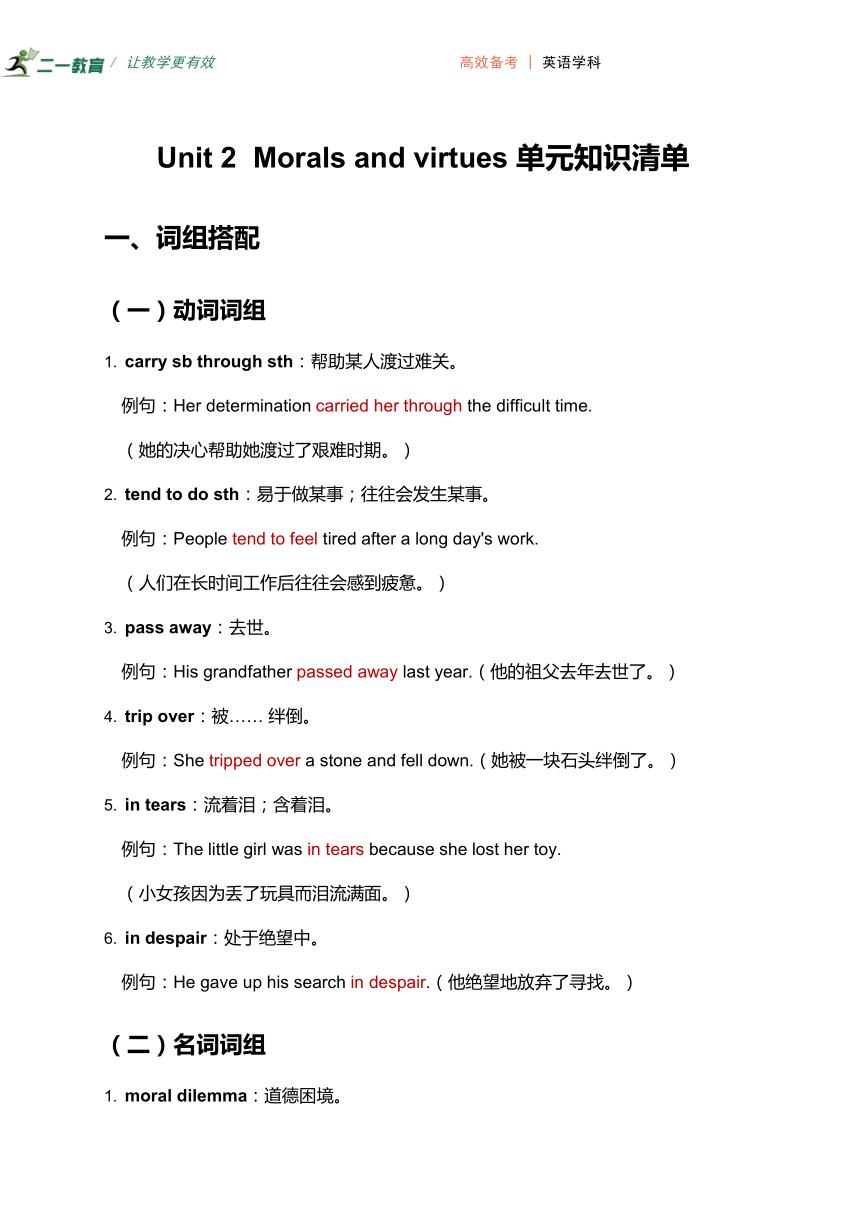
|
|
| 格式 | docx | ||
| 文件大小 | 40.8KB | ||
| 资源类型 | 试卷 | ||
| 版本资源 | 人教版(2019) | ||
| 科目 | 英语 | ||
| 更新时间 | 2025-07-13 11:04:08 | ||
图片预览

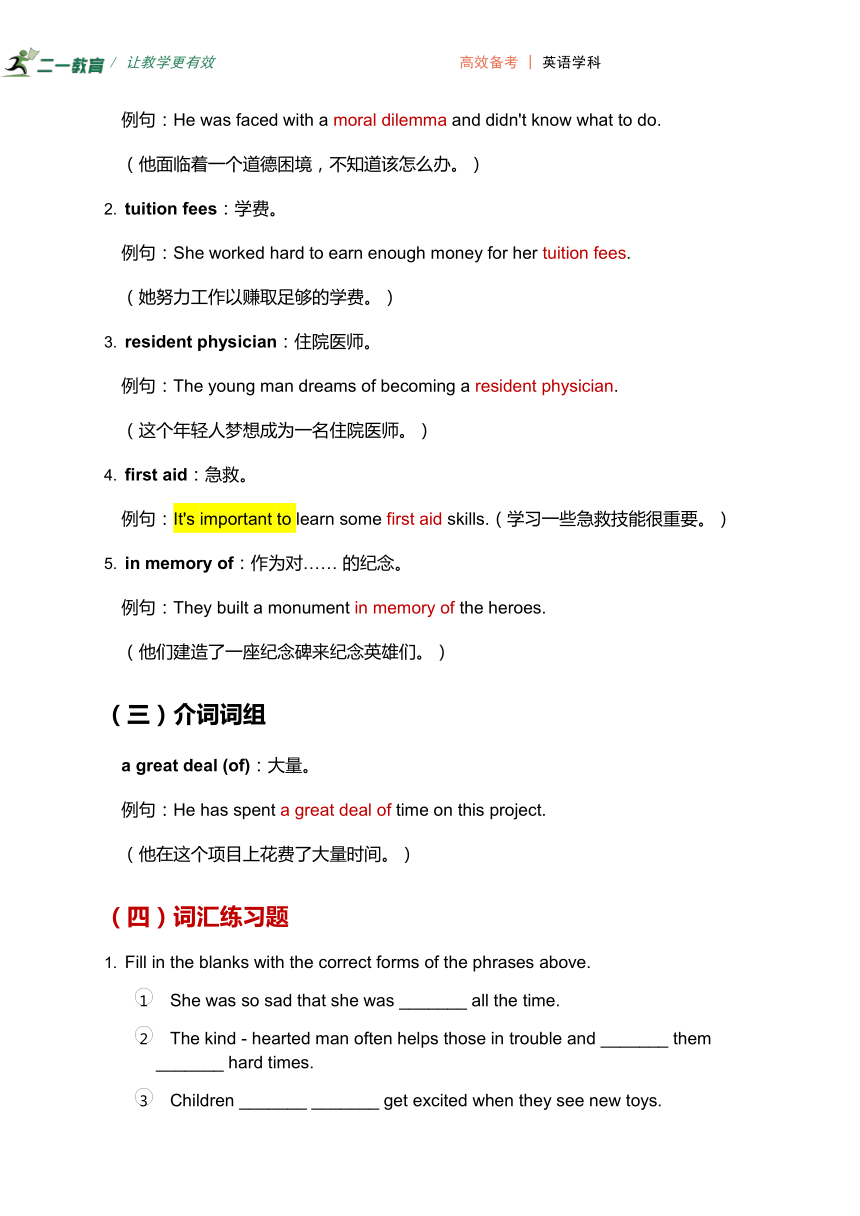
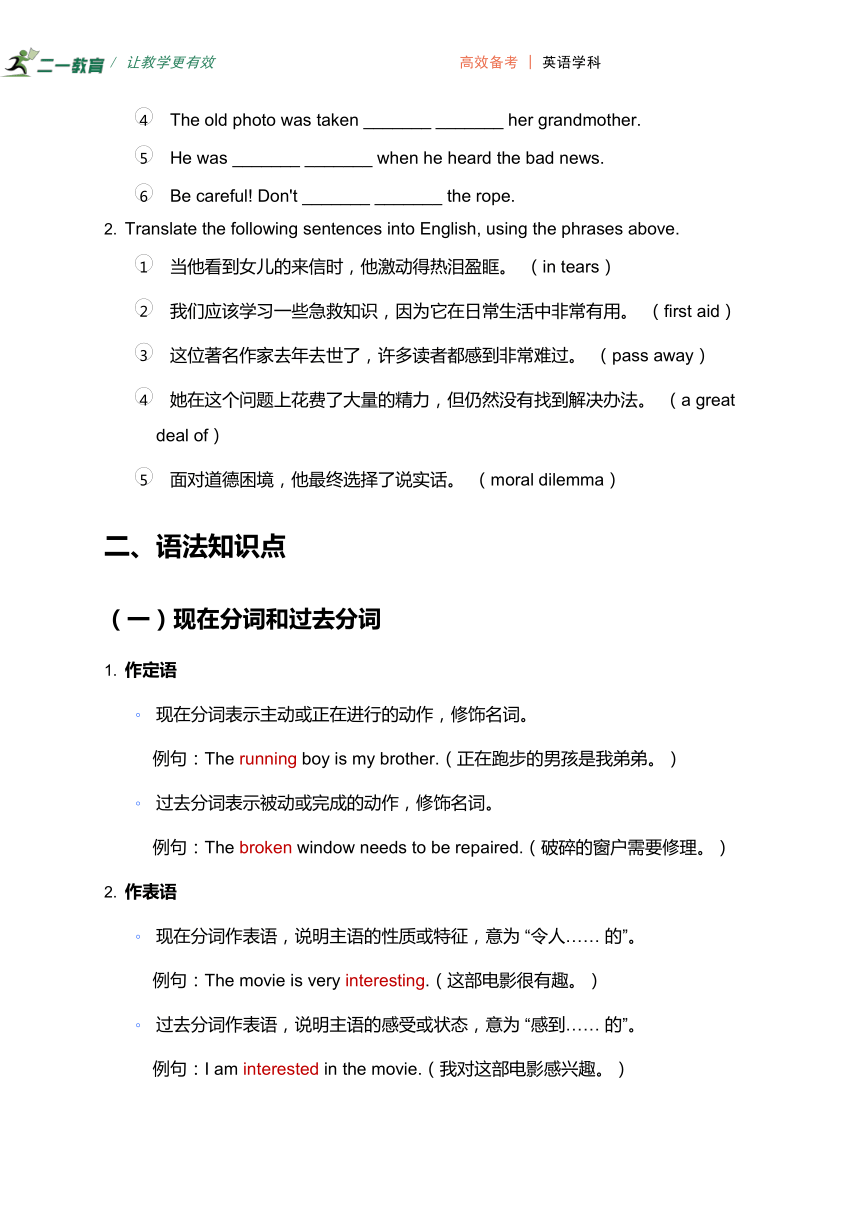
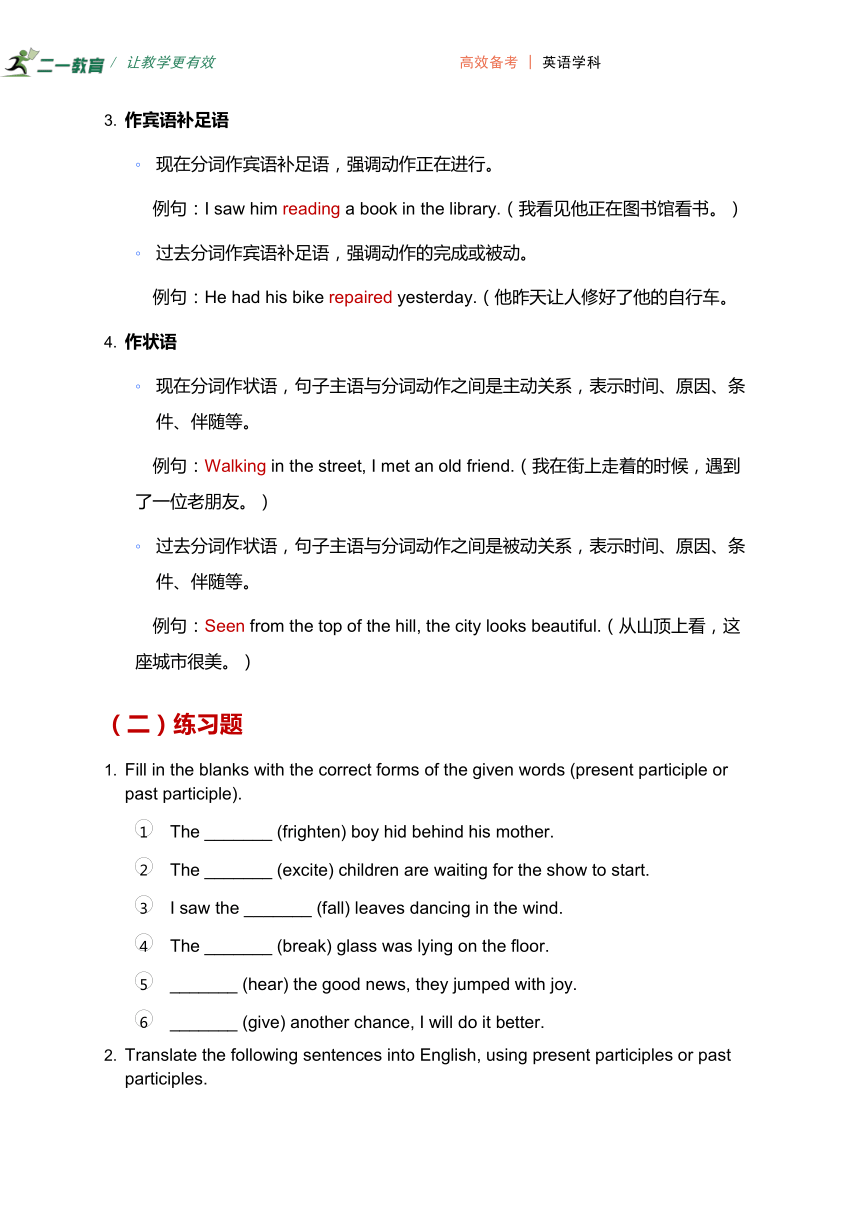
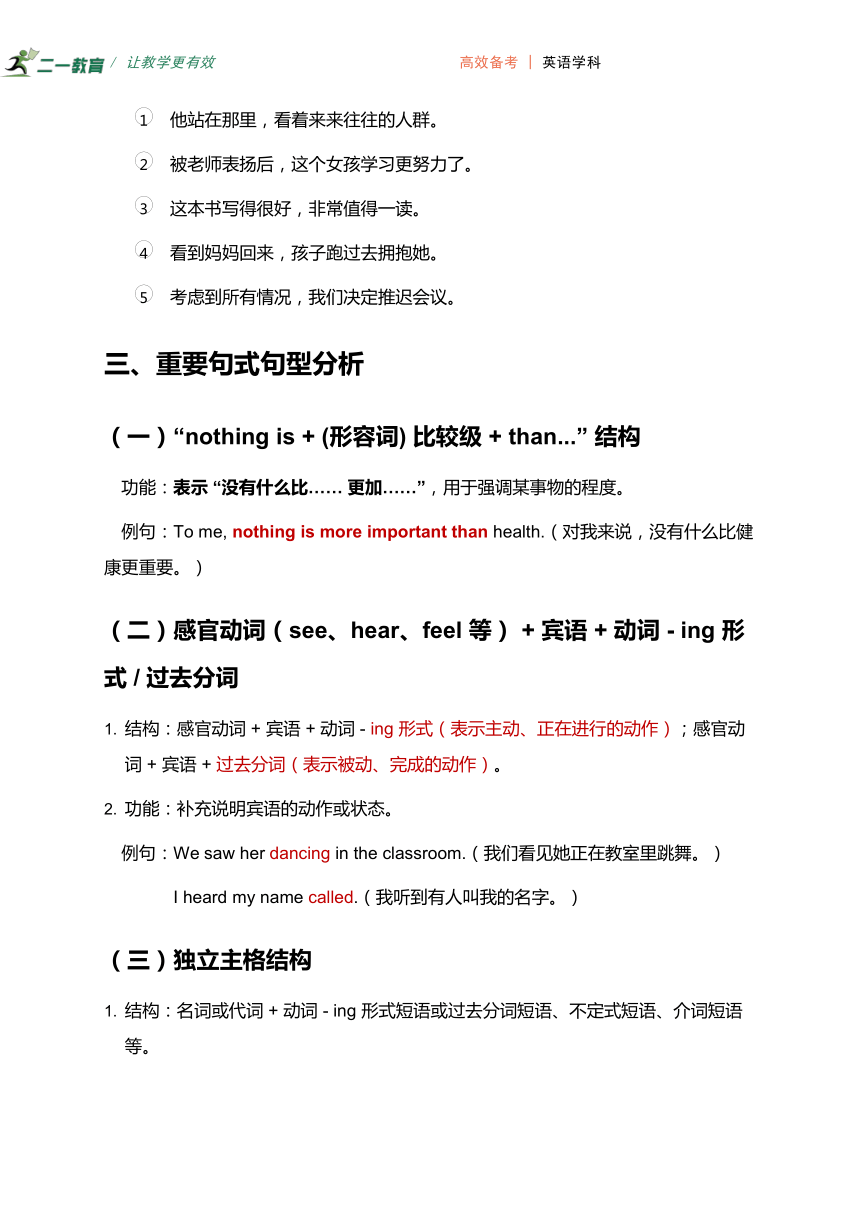
文档简介
/ 让教学更有效 高效备考 | 英语学科
Unit 2 Morals and virtues 单元知识清单
一、词组搭配
(一)动词词组
carry sb through sth:帮助某人渡过难关。
例句:Her determination carried her through the difficult time.
(她的决心帮助她渡过了艰难时期。)
tend to do sth:易于做某事;往往会发生某事。
例句:People tend to feel tired after a long day's work.
(人们在长时间工作后往往会感到疲惫。)
pass away:去世。
例句:His grandfather passed away last year.(他的祖父去年去世了。)
trip over:被…… 绊倒。
例句:She tripped over a stone and fell down.(她被一块石头绊倒了。)
in tears:流着泪;含着泪。
例句:The little girl was in tears because she lost her toy.
(小女孩因为丢了玩具而泪流满面。)
in despair:处于绝望中。
例句:He gave up his search in despair.(他绝望地放弃了寻找。)
(二)名词词组
moral dilemma:道德困境。
例句:He was faced with a moral dilemma and didn't know what to do.
(他面临着一个道德困境,不知道该怎么办。)
tuition fees:学费。
例句:She worked hard to earn enough money for her tuition fees.
(她努力工作以赚取足够的学费。)
resident physician:住院医师。
例句:The young man dreams of becoming a resident physician.
(这个年轻人梦想成为一名住院医师。)
first aid:急救。
例句:It's important to learn some first aid skills.(学习一些急救技能很重要。)
in memory of:作为对…… 的纪念。
例句:They built a monument in memory of the heroes.
(他们建造了一座纪念碑来纪念英雄们。)
(三)介词词组
a great deal (of):大量。
例句:He has spent a great deal of time on this project.
(他在这个项目上花费了大量时间。)
(四)词汇练习题
Fill in the blanks with the correct forms of the phrases above.
She was so sad that she was _______ all the time.
The kind - hearted man often helps those in trouble and _______ them _______ hard times.
Children _______ _______ get excited when they see new toys.
The old photo was taken _______ _______ her grandmother.
He was _______ _______ when he heard the bad news.
Be careful! Don't _______ _______ the rope.
Translate the following sentences into English, using the phrases above.
当他看到女儿的来信时,他激动得热泪盈眶。
(in tears)
我们应该学习一些急救知识,因为它在日常生活中非常有用。
(first aid)
这位著名作家去年去世了,许多读者都感到非常难过。
(pass away)
她在这个问题上花费了大量的精力,但仍然没有找到解决办法。
(a great deal of)
面对道德困境,他最终选择了说实话。
(moral dilemma)
二、语法知识点
(一)现在分词和过去分词
作定语
现在分词表示主动或正在进行的动作,修饰名词。
例句:The running boy is my brother.(正在跑步的男孩是我弟弟。)
过去分词表示被动或完成的动作,修饰名词。
例句:The broken window needs to be repaired.(破碎的窗户需要修理。)
作表语
现在分词作表语,说明主语的性质或特征,意为 “令人…… 的”。
例句:The movie is very interesting.(这部电影很有趣。)
过去分词作表语,说明主语的感受或状态,意为 “感到…… 的”。
例句:I am interested in the movie.(我对这部电影感兴趣。)
作宾语补足语
现在分词作宾语补足语,强调动作正在进行。
例句:I saw him reading a book in the library.(我看见他正在图书馆看书。)
过去分词作宾语补足语,强调动作的完成或被动。
例句:He had his bike repaired yesterday.(他昨天让人修好了他的自行车。
作状语
现在分词作状语,句子主语与分词动作之间是主动关系,表示时间、原因、条件、伴随等。
例句:Walking in the street, I met an old friend.(我在街上走着的时候,遇到了一位老朋友。)
过去分词作状语,句子主语与分词动作之间是被动关系,表示时间、原因、条件、伴随等。
例句:Seen from the top of the hill, the city looks beautiful.(从山顶上看,这座城市很美。)
(二)练习题
Fill in the blanks with the correct forms of the given words (present participle or past participle).
The _______ (frighten) boy hid behind his mother.
The _______ (excite) children are waiting for the show to start.
I saw the _______ (fall) leaves dancing in the wind.
The _______ (break) glass was lying on the floor.
_______ (hear) the good news, they jumped with joy.
_______ (give) another chance, I will do it better.
Translate the following sentences into English, using present participles or past participles.
他站在那里,看着来来往往的人群。
被老师表扬后,这个女孩学习更努力了。
这本书写得很好,非常值得一读。
看到妈妈回来,孩子跑过去拥抱她。
考虑到所有情况,我们决定推迟会议。
三、重要句式句型分析
(一)“nothing is + (形容词) 比较级 + than...” 结构
功能:表示 “没有什么比…… 更加……”,用于强调某事物的程度。
例句:To me, nothing is more important than health.(对我来说,没有什么比健康更重要。)
(二)感官动词(see、hear、feel 等) + 宾语 + 动词 - ing 形式 / 过去分词
结构:感官动词 + 宾语 + 动词 - ing 形式(表示主动、正在进行的动作);感官动词 + 宾语 + 过去分词(表示被动、完成的动作)。
功能:补充说明宾语的动作或状态。
例句:We saw her dancing in the classroom.(我们看见她正在教室里跳舞。)
I heard my name called.(我听到有人叫我的名字。)
(三)独立主格结构
结构:名词或代词 + 动词 - ing 形式短语或过去分词短语、不定式短语、介词短语等。
功能:在句中作状语,表示时间、条件、原因、伴随、目的或结果等,名词或代词和其后的短语构成逻辑上的主谓关系。
例句:The weather being fine, we went on a picnic.
(天气很好,我们去野餐了。)
(四)翻译练习题
对学生来说,没有什么比获取知识更重要。
我看见他正在和老师交谈。
她发现窗户被打破了,感到很害怕。
天气寒冷,他们决定待在家里。
他完成工作后,回家休息了。
四、单元书面表达写作指导
(一)重要词汇词组搭配积累
道德与美德相关词汇:moral, virtue, dilemma, integrity, kindness, generosity, righteousness, propriety, wisdom, fidelity
人物品质相关词汇:compassionate, responsible, selfless, determined, honest, friendly, courageous
动作行为相关词汇:entrust, assist, reject, appoint, elect, tend, publish, rescue, treat
词组搭配:carry sb through sth, tend to do sth, in memory of, a great deal of, in tears, in despair
(二)高分句式积累
It is + adj. + for sb. to do sth.
例句:It is necessary for us to develop good moral qualities.
(对我们来说,培养良好的道德品质是必要的。)
What + 主语 + 谓语 + is...
例句:What impresses me most is his kindness.
(最让我印象深刻的是他的善良。)
Not only...but also...
例句:She is not only intelligent but also hard - working.
(她不仅聪明而且勤奋。)
It was...that...(强调句)
例句:It was his determination that carried him through the difficulties.
(正是他的决心帮助他渡过了难关。)
(三)参考范文
The Power of Kindness
Kindness is one of the most precious virtues in the world. It has the power to warm people's hearts and make the world a better place.
I still remember a cold winter day when I witnessed an act of kindness. I was waiting at the bus stop, shivering with cold. An old man was also there, looking weak and helpless. Suddenly, a young man came up to him. He took off his own scarf and gently put it around the old man's neck, saying, “Grandpa, it's too cold. Keep warm.” Then he helped the old man onto the bus when it arrived.
The young man's kindness deeply touched me. His simple act not only brought warmth to the old man but also inspired me. It made me realize that even a small act of kindness can have a great impact on others. In our daily life, we should always be ready to show kindness to those in need.
答案及解析
一、词汇练习题答案及解析
1.填词组
答案:in tears
解析:“She was so sad” 表明她处于悲伤的状态,“in tears” 意思是 “流着泪;含着泪”,符合语境,用于描述她因悲伤而哭泣的样子 。
答案:carries; through
解析:“The kind - hearted man often helps those in trouble” 说明善良的人帮助有困难的人,“carry sb through sth” 表示 “帮助某人渡过难关”,这里主语是第三人称单数 “The kind - hearted man”,一般现在时中动词要用第三人称单数形式 “carries” ,“hard times”(艰难时期)作 “through” 的宾语。
答案:tend to
解析:“Children get excited when they see new toys” 描述孩子看到新玩具时的普遍情况,“tend to do sth” 意为 “易于做某事;往往会发生某事”,符合句子表达孩子们通常会因新玩具而兴奋的逻辑,主语 “Children” 是复数,动词用原形 “tend” 。
答案:in memory of
解析:“The old photo” 和 “her grandmother” 的关系,结合 “in memory of” 表示 “作为对…… 的纪念”,可知此句表达这张老照片是为了纪念她的祖母,所以填 “in memory of” 。
答案:in despair
解析:“he heard the bad news” 是不好的事情,“in despair” 表示 “处于绝望中”,能合理说明他听到坏消息后的状态 。
答案:trip over
解析:“Be careful!” 提醒小心,“the rope”(绳子)是潜在的阻碍物,“trip over” 意思是 “被…… 绊倒”,符合句子提醒不要被绳子绊倒的语境 。
用所给词组翻译句子
答案:When he saw his daughter's letter, he was in tears with excitement.
解析:“当…… 时” 用 “When” 引导时间状语从句,“saw his daughter's letter” 表示 “看到女儿的来信”;主句描述他的状态,“in tears” 表示 “热泪盈眶” ,“with excitement” 表示 “激动地”,补充说明流泪的原因。
答案:We should learn some first aid knowledge because it is very useful in daily life.
解析:“应该” 用 “should”,“学习一些急救知识” 翻译为 “learn some first aid knowledge”;“因为” 用 “because” 引导原因状语从句,“first aid” 表示 “急救” ,“in daily life” 表示 “在日常生活中”。
答案:The famous writer passed away last year, and many readers felt very sad.
解析:“去世” 用 “pass away”,根据 “去年” 可知时态为一般过去时,所以用 “passed away”;后半句用 “and” 连接,描述读者的感受,“felt very sad” 表示 “感到非常难过” 。
答案:She spent a great deal of energy on this problem, but still didn't find a solution.
解析:“花费大量精力” 用 “spend a great deal of energy”,“a great deal of” 表示 “大量” ,可修饰不可数名词 “energy”;“在…… 上” 用 “on”;“but” 表示转折,“didn't find a solution” 表示 “没有找到解决办法”。
答案:Faced with a moral dilemma, he finally chose to tell the truth.
解析:“面对” 用 “be faced with”,这里用过去分词短语 “Faced with a moral dilemma” 作状语,表示原因或条件;“道德困境” 是 “moral dilemma”;“选择做某事” 用 “choose to do sth”,“tell the truth” 表示 “说实话”,根据语境用一般过去时 “chose” 。
二、语法知识点练习题答案及解析
1.用现在分词或过去分词填空
答案:frightened
解析:“boy”(男孩)和 “frighten”(使害怕)之间是被动关系,即男孩是被吓到的,过去分词 “frightened” 表示被动和完成,用于修饰人,描述人的感受,所以填 “frightened” ,表示 “受到惊吓的男孩”。
答案:excited
解析:“children”(孩子们)和 “excite”(使兴奋)是被动关系,孩子们是因外界事物而感到兴奋,过去分词 “excited” 用于描述人的感受,作定语修饰 “children”,表示 “兴奋的孩子们” 。
答案:falling
解析:“leaves”(树叶)和 “fall”(落下)是主动关系,树叶是主动飘落,现在分词 “falling” 表示主动和正在进行的动作,修饰 “leaves”,表示 “正在飘落的树叶” 。
答案:broken
解析:“glass”(玻璃)和 “break”(打破)是被动关系,玻璃是被打破的,过去分词 “broken” 表示被动和完成,修饰 “glass”,表示 “破碎的玻璃” 。
答案:Hearing
解析:“they”(他们)和 “hear”(听到)是主动关系,句子主语 “they” 是 “hear” 这个动作的执行者,现在分词作状语,“Hearing the good news” 在句中作时间状语,相当于 “When they heard the good news”,表示 “听到这个好消息时” ,且分词短语位于句首,首字母大写。
答案:Given
解析:“I” 和 “give” 是被动关系,“我” 是被给予机会,过去分词 “Given” 作条件状语,相当于 “If I am given another chance”,表示 “如果再给我一次机会” 。
2.翻译句子
答案:He stood there, watching the crowds coming and going.
解析:句子主干 “He stood there” 表示 “他站在那里”;“watching the crowds coming and going” 是现在分词短语作伴随状语,“watch” 和句子主语 “He” 是主动关系,“coming and going” 是现在分词短语作宾语 “the crowds” 的补足语,描述人群来来往往的状态 。
答案:Praised by the teacher, the girl studied harder.
解析:“Praised by the teacher” 是过去分词短语作原因状语,“the girl” 和 “praise” 是被动关系,即女孩被老师表扬,所以用过去分词;句子主干 “the girl studied harder” 表示 “这个女孩学习更努力了”,时态为一般过去时 。
答案:Well written, the book is well worth reading.
解析:“Well written” 是过去分词短语作原因状语,“the book” 和 “write” 是被动关系,书是被写,所以用过去分词;“be worth doing sth” 表示 “值得做某事”,“reading” 是 “read” 的动名词形式,“well” 修饰 “worth”,强调值得的程度 。
答案:Seeing her mother come back, the child ran to hug her.
解析:“Seeing her mother come back” 是现在分词短语作时间状语,“the child” 和 “see” 是主动关系,孩子是看到妈妈回来这个动作的执行者;“come back” 是省略了 “to” 的不定式作宾语补足语,补充说明 “her mother” 的动作;句子主干 “the child ran to hug her” 表示 “孩子跑过去拥抱她”,时态为一般过去时 。
答案:All things considered, we decided to put off the meeting.
解析:“All things considered” 是独立主格结构作条件状语,“All things” 和 “consider” 是被动关系,所有情况是被考虑,所以用过去分词 “considered”;句子主干 “we decided to put off the meeting” 表示 “我们决定推迟会议”,“decide to do sth” 表示 “决定做某事”,“put off” 表示 “推迟” 。
三、重要句式句型分析翻译练习题答案及解析
答案:For students, nothing is more important than acquiring knowledge.
解析:使用 “nothing is + (形容词) 比较级 + than...” 结构强调获取知识的重要性,“more important” 是 “important” 的比较级;“acquiring knowledge” 表示 “获取知识”,“For students” 表示 “对学生来说” 。
答案:I saw him talking with the teacher.
解析:运用 “感官动词(see) + 宾语 + 动词 - ing 形式” 结构,“saw” 是 “see” 的过去式,“him” 是宾语,“talking with the teacher” 是现在分词短语作宾语补足语,表示动作正在进行,即 “我看见他正在和老师交谈” 。
答案:She found the window broken and felt very frightened.
解析:“感官动词(found) + 宾语(the window) + 过去分词(broken)” 结构,“window” 和 “break” 是被动关系,窗户是被打破的,所以用过去分词 “broken” 作宾语补足语;“felt very frightened” 表示 “感到很害怕”,与 “found” 并列作谓语,时态为一般过去时 。
答案:The weather being cold, they decided to stay at home.
解析:采用独立主格结构,“The weather” 和 “being cold” 构成逻辑上的主谓关系,“being cold” 是现在分词短语作后置定语修饰 “The weather”,表示 “天气寒冷”;句子主干 “they decided to stay at home” 表示 “他们决定待在家里”,“decide to do sth” 表示 “决定做某事” 。
答案:Having finished his work, he went home to rest.
解析:现在分词完成式 “Having finished his work” 作时间状语,“he” 和 “finish” 是主动关系,且 “完成工作” 这个动作发生在 “回家休息” 之前,所以用现在分词完成式;句子主干 “he went home to rest” 表示 “他回家休息了”,“to rest” 是不定式作目的状语 。
Unit 2 Morals and virtues 单元知识清单
一、词组搭配
(一)动词词组
carry sb through sth:帮助某人渡过难关。
例句:Her determination carried her through the difficult time.
(她的决心帮助她渡过了艰难时期。)
tend to do sth:易于做某事;往往会发生某事。
例句:People tend to feel tired after a long day's work.
(人们在长时间工作后往往会感到疲惫。)
pass away:去世。
例句:His grandfather passed away last year.(他的祖父去年去世了。)
trip over:被…… 绊倒。
例句:She tripped over a stone and fell down.(她被一块石头绊倒了。)
in tears:流着泪;含着泪。
例句:The little girl was in tears because she lost her toy.
(小女孩因为丢了玩具而泪流满面。)
in despair:处于绝望中。
例句:He gave up his search in despair.(他绝望地放弃了寻找。)
(二)名词词组
moral dilemma:道德困境。
例句:He was faced with a moral dilemma and didn't know what to do.
(他面临着一个道德困境,不知道该怎么办。)
tuition fees:学费。
例句:She worked hard to earn enough money for her tuition fees.
(她努力工作以赚取足够的学费。)
resident physician:住院医师。
例句:The young man dreams of becoming a resident physician.
(这个年轻人梦想成为一名住院医师。)
first aid:急救。
例句:It's important to learn some first aid skills.(学习一些急救技能很重要。)
in memory of:作为对…… 的纪念。
例句:They built a monument in memory of the heroes.
(他们建造了一座纪念碑来纪念英雄们。)
(三)介词词组
a great deal (of):大量。
例句:He has spent a great deal of time on this project.
(他在这个项目上花费了大量时间。)
(四)词汇练习题
Fill in the blanks with the correct forms of the phrases above.
She was so sad that she was _______ all the time.
The kind - hearted man often helps those in trouble and _______ them _______ hard times.
Children _______ _______ get excited when they see new toys.
The old photo was taken _______ _______ her grandmother.
He was _______ _______ when he heard the bad news.
Be careful! Don't _______ _______ the rope.
Translate the following sentences into English, using the phrases above.
当他看到女儿的来信时,他激动得热泪盈眶。
(in tears)
我们应该学习一些急救知识,因为它在日常生活中非常有用。
(first aid)
这位著名作家去年去世了,许多读者都感到非常难过。
(pass away)
她在这个问题上花费了大量的精力,但仍然没有找到解决办法。
(a great deal of)
面对道德困境,他最终选择了说实话。
(moral dilemma)
二、语法知识点
(一)现在分词和过去分词
作定语
现在分词表示主动或正在进行的动作,修饰名词。
例句:The running boy is my brother.(正在跑步的男孩是我弟弟。)
过去分词表示被动或完成的动作,修饰名词。
例句:The broken window needs to be repaired.(破碎的窗户需要修理。)
作表语
现在分词作表语,说明主语的性质或特征,意为 “令人…… 的”。
例句:The movie is very interesting.(这部电影很有趣。)
过去分词作表语,说明主语的感受或状态,意为 “感到…… 的”。
例句:I am interested in the movie.(我对这部电影感兴趣。)
作宾语补足语
现在分词作宾语补足语,强调动作正在进行。
例句:I saw him reading a book in the library.(我看见他正在图书馆看书。)
过去分词作宾语补足语,强调动作的完成或被动。
例句:He had his bike repaired yesterday.(他昨天让人修好了他的自行车。
作状语
现在分词作状语,句子主语与分词动作之间是主动关系,表示时间、原因、条件、伴随等。
例句:Walking in the street, I met an old friend.(我在街上走着的时候,遇到了一位老朋友。)
过去分词作状语,句子主语与分词动作之间是被动关系,表示时间、原因、条件、伴随等。
例句:Seen from the top of the hill, the city looks beautiful.(从山顶上看,这座城市很美。)
(二)练习题
Fill in the blanks with the correct forms of the given words (present participle or past participle).
The _______ (frighten) boy hid behind his mother.
The _______ (excite) children are waiting for the show to start.
I saw the _______ (fall) leaves dancing in the wind.
The _______ (break) glass was lying on the floor.
_______ (hear) the good news, they jumped with joy.
_______ (give) another chance, I will do it better.
Translate the following sentences into English, using present participles or past participles.
他站在那里,看着来来往往的人群。
被老师表扬后,这个女孩学习更努力了。
这本书写得很好,非常值得一读。
看到妈妈回来,孩子跑过去拥抱她。
考虑到所有情况,我们决定推迟会议。
三、重要句式句型分析
(一)“nothing is + (形容词) 比较级 + than...” 结构
功能:表示 “没有什么比…… 更加……”,用于强调某事物的程度。
例句:To me, nothing is more important than health.(对我来说,没有什么比健康更重要。)
(二)感官动词(see、hear、feel 等) + 宾语 + 动词 - ing 形式 / 过去分词
结构:感官动词 + 宾语 + 动词 - ing 形式(表示主动、正在进行的动作);感官动词 + 宾语 + 过去分词(表示被动、完成的动作)。
功能:补充说明宾语的动作或状态。
例句:We saw her dancing in the classroom.(我们看见她正在教室里跳舞。)
I heard my name called.(我听到有人叫我的名字。)
(三)独立主格结构
结构:名词或代词 + 动词 - ing 形式短语或过去分词短语、不定式短语、介词短语等。
功能:在句中作状语,表示时间、条件、原因、伴随、目的或结果等,名词或代词和其后的短语构成逻辑上的主谓关系。
例句:The weather being fine, we went on a picnic.
(天气很好,我们去野餐了。)
(四)翻译练习题
对学生来说,没有什么比获取知识更重要。
我看见他正在和老师交谈。
她发现窗户被打破了,感到很害怕。
天气寒冷,他们决定待在家里。
他完成工作后,回家休息了。
四、单元书面表达写作指导
(一)重要词汇词组搭配积累
道德与美德相关词汇:moral, virtue, dilemma, integrity, kindness, generosity, righteousness, propriety, wisdom, fidelity
人物品质相关词汇:compassionate, responsible, selfless, determined, honest, friendly, courageous
动作行为相关词汇:entrust, assist, reject, appoint, elect, tend, publish, rescue, treat
词组搭配:carry sb through sth, tend to do sth, in memory of, a great deal of, in tears, in despair
(二)高分句式积累
It is + adj. + for sb. to do sth.
例句:It is necessary for us to develop good moral qualities.
(对我们来说,培养良好的道德品质是必要的。)
What + 主语 + 谓语 + is...
例句:What impresses me most is his kindness.
(最让我印象深刻的是他的善良。)
Not only...but also...
例句:She is not only intelligent but also hard - working.
(她不仅聪明而且勤奋。)
It was...that...(强调句)
例句:It was his determination that carried him through the difficulties.
(正是他的决心帮助他渡过了难关。)
(三)参考范文
The Power of Kindness
Kindness is one of the most precious virtues in the world. It has the power to warm people's hearts and make the world a better place.
I still remember a cold winter day when I witnessed an act of kindness. I was waiting at the bus stop, shivering with cold. An old man was also there, looking weak and helpless. Suddenly, a young man came up to him. He took off his own scarf and gently put it around the old man's neck, saying, “Grandpa, it's too cold. Keep warm.” Then he helped the old man onto the bus when it arrived.
The young man's kindness deeply touched me. His simple act not only brought warmth to the old man but also inspired me. It made me realize that even a small act of kindness can have a great impact on others. In our daily life, we should always be ready to show kindness to those in need.
答案及解析
一、词汇练习题答案及解析
1.填词组
答案:in tears
解析:“She was so sad” 表明她处于悲伤的状态,“in tears” 意思是 “流着泪;含着泪”,符合语境,用于描述她因悲伤而哭泣的样子 。
答案:carries; through
解析:“The kind - hearted man often helps those in trouble” 说明善良的人帮助有困难的人,“carry sb through sth” 表示 “帮助某人渡过难关”,这里主语是第三人称单数 “The kind - hearted man”,一般现在时中动词要用第三人称单数形式 “carries” ,“hard times”(艰难时期)作 “through” 的宾语。
答案:tend to
解析:“Children get excited when they see new toys” 描述孩子看到新玩具时的普遍情况,“tend to do sth” 意为 “易于做某事;往往会发生某事”,符合句子表达孩子们通常会因新玩具而兴奋的逻辑,主语 “Children” 是复数,动词用原形 “tend” 。
答案:in memory of
解析:“The old photo” 和 “her grandmother” 的关系,结合 “in memory of” 表示 “作为对…… 的纪念”,可知此句表达这张老照片是为了纪念她的祖母,所以填 “in memory of” 。
答案:in despair
解析:“he heard the bad news” 是不好的事情,“in despair” 表示 “处于绝望中”,能合理说明他听到坏消息后的状态 。
答案:trip over
解析:“Be careful!” 提醒小心,“the rope”(绳子)是潜在的阻碍物,“trip over” 意思是 “被…… 绊倒”,符合句子提醒不要被绳子绊倒的语境 。
用所给词组翻译句子
答案:When he saw his daughter's letter, he was in tears with excitement.
解析:“当…… 时” 用 “When” 引导时间状语从句,“saw his daughter's letter” 表示 “看到女儿的来信”;主句描述他的状态,“in tears” 表示 “热泪盈眶” ,“with excitement” 表示 “激动地”,补充说明流泪的原因。
答案:We should learn some first aid knowledge because it is very useful in daily life.
解析:“应该” 用 “should”,“学习一些急救知识” 翻译为 “learn some first aid knowledge”;“因为” 用 “because” 引导原因状语从句,“first aid” 表示 “急救” ,“in daily life” 表示 “在日常生活中”。
答案:The famous writer passed away last year, and many readers felt very sad.
解析:“去世” 用 “pass away”,根据 “去年” 可知时态为一般过去时,所以用 “passed away”;后半句用 “and” 连接,描述读者的感受,“felt very sad” 表示 “感到非常难过” 。
答案:She spent a great deal of energy on this problem, but still didn't find a solution.
解析:“花费大量精力” 用 “spend a great deal of energy”,“a great deal of” 表示 “大量” ,可修饰不可数名词 “energy”;“在…… 上” 用 “on”;“but” 表示转折,“didn't find a solution” 表示 “没有找到解决办法”。
答案:Faced with a moral dilemma, he finally chose to tell the truth.
解析:“面对” 用 “be faced with”,这里用过去分词短语 “Faced with a moral dilemma” 作状语,表示原因或条件;“道德困境” 是 “moral dilemma”;“选择做某事” 用 “choose to do sth”,“tell the truth” 表示 “说实话”,根据语境用一般过去时 “chose” 。
二、语法知识点练习题答案及解析
1.用现在分词或过去分词填空
答案:frightened
解析:“boy”(男孩)和 “frighten”(使害怕)之间是被动关系,即男孩是被吓到的,过去分词 “frightened” 表示被动和完成,用于修饰人,描述人的感受,所以填 “frightened” ,表示 “受到惊吓的男孩”。
答案:excited
解析:“children”(孩子们)和 “excite”(使兴奋)是被动关系,孩子们是因外界事物而感到兴奋,过去分词 “excited” 用于描述人的感受,作定语修饰 “children”,表示 “兴奋的孩子们” 。
答案:falling
解析:“leaves”(树叶)和 “fall”(落下)是主动关系,树叶是主动飘落,现在分词 “falling” 表示主动和正在进行的动作,修饰 “leaves”,表示 “正在飘落的树叶” 。
答案:broken
解析:“glass”(玻璃)和 “break”(打破)是被动关系,玻璃是被打破的,过去分词 “broken” 表示被动和完成,修饰 “glass”,表示 “破碎的玻璃” 。
答案:Hearing
解析:“they”(他们)和 “hear”(听到)是主动关系,句子主语 “they” 是 “hear” 这个动作的执行者,现在分词作状语,“Hearing the good news” 在句中作时间状语,相当于 “When they heard the good news”,表示 “听到这个好消息时” ,且分词短语位于句首,首字母大写。
答案:Given
解析:“I” 和 “give” 是被动关系,“我” 是被给予机会,过去分词 “Given” 作条件状语,相当于 “If I am given another chance”,表示 “如果再给我一次机会” 。
2.翻译句子
答案:He stood there, watching the crowds coming and going.
解析:句子主干 “He stood there” 表示 “他站在那里”;“watching the crowds coming and going” 是现在分词短语作伴随状语,“watch” 和句子主语 “He” 是主动关系,“coming and going” 是现在分词短语作宾语 “the crowds” 的补足语,描述人群来来往往的状态 。
答案:Praised by the teacher, the girl studied harder.
解析:“Praised by the teacher” 是过去分词短语作原因状语,“the girl” 和 “praise” 是被动关系,即女孩被老师表扬,所以用过去分词;句子主干 “the girl studied harder” 表示 “这个女孩学习更努力了”,时态为一般过去时 。
答案:Well written, the book is well worth reading.
解析:“Well written” 是过去分词短语作原因状语,“the book” 和 “write” 是被动关系,书是被写,所以用过去分词;“be worth doing sth” 表示 “值得做某事”,“reading” 是 “read” 的动名词形式,“well” 修饰 “worth”,强调值得的程度 。
答案:Seeing her mother come back, the child ran to hug her.
解析:“Seeing her mother come back” 是现在分词短语作时间状语,“the child” 和 “see” 是主动关系,孩子是看到妈妈回来这个动作的执行者;“come back” 是省略了 “to” 的不定式作宾语补足语,补充说明 “her mother” 的动作;句子主干 “the child ran to hug her” 表示 “孩子跑过去拥抱她”,时态为一般过去时 。
答案:All things considered, we decided to put off the meeting.
解析:“All things considered” 是独立主格结构作条件状语,“All things” 和 “consider” 是被动关系,所有情况是被考虑,所以用过去分词 “considered”;句子主干 “we decided to put off the meeting” 表示 “我们决定推迟会议”,“decide to do sth” 表示 “决定做某事”,“put off” 表示 “推迟” 。
三、重要句式句型分析翻译练习题答案及解析
答案:For students, nothing is more important than acquiring knowledge.
解析:使用 “nothing is + (形容词) 比较级 + than...” 结构强调获取知识的重要性,“more important” 是 “important” 的比较级;“acquiring knowledge” 表示 “获取知识”,“For students” 表示 “对学生来说” 。
答案:I saw him talking with the teacher.
解析:运用 “感官动词(see) + 宾语 + 动词 - ing 形式” 结构,“saw” 是 “see” 的过去式,“him” 是宾语,“talking with the teacher” 是现在分词短语作宾语补足语,表示动作正在进行,即 “我看见他正在和老师交谈” 。
答案:She found the window broken and felt very frightened.
解析:“感官动词(found) + 宾语(the window) + 过去分词(broken)” 结构,“window” 和 “break” 是被动关系,窗户是被打破的,所以用过去分词 “broken” 作宾语补足语;“felt very frightened” 表示 “感到很害怕”,与 “found” 并列作谓语,时态为一般过去时 。
答案:The weather being cold, they decided to stay at home.
解析:采用独立主格结构,“The weather” 和 “being cold” 构成逻辑上的主谓关系,“being cold” 是现在分词短语作后置定语修饰 “The weather”,表示 “天气寒冷”;句子主干 “they decided to stay at home” 表示 “他们决定待在家里”,“decide to do sth” 表示 “决定做某事” 。
答案:Having finished his work, he went home to rest.
解析:现在分词完成式 “Having finished his work” 作时间状语,“he” 和 “finish” 是主动关系,且 “完成工作” 这个动作发生在 “回家休息” 之前,所以用现在分词完成式;句子主干 “he went home to rest” 表示 “他回家休息了”,“to rest” 是不定式作目的状语 。
